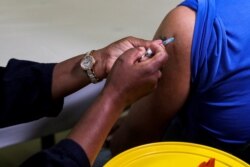South African medical experts say a drop in coronavirus cases indicates the country has passed the peak of a fourth wave of infections driven by the omicron variant. Health officials say the omicron variant spreads faster than previous variants but has hospitalized far fewer patients.
The number of new coronavirus cases in South Africa’s most populous province of Gauteng is on the decline.
Health officials say, while some areas of the country are still seeing increases, most provinces are levelling off.
More than 15,000 positive cases were reported Tuesday nationwide — a marked decline from the over 26,000 daily cases seen a week ago.
Dr. Michelle Groome is with the National Institute for Communicable Diseases.
“All indications are that we've seen the end of the — that we've surpassed the peak of infections in Gauteng. This is encouraging and quite optimistic in terms of the decreasing trends in case numbers. But I think we really do need to be cognizant that … people are now traveling, and there may be changes in terms of the number of people that may be testing and so some of the lower numbers may be due to the holiday season,” she said.
Groome says omicron is the dominant variant driving the wave, accounting for 95% of cases this month.
While it has spread more rapidly than previous variants, it isn’t causing the same level of severe illness.
Dr. Waasila Jassat is a public health specialist at the National Institute for Communicable Diseases.
“In terms of severity, there's a lower percentage of hospital admissions, a low percentage of cases have been admitted, and a lower percentage of admissions who have died. And there are signals towards lower severity amongst those admitted and shorter lengths of stay,” she said.
It’s unclear if the lower level of hospitalizations is because omicron is less severe than other variants or that the public is more resilient to the virus.
Groome says as many as 70% of South Africans have some level of immunity to the coronavirus, either through vaccination or previous infection.
Less than half of South African adults have been vaccinated despite ongoing government efforts urging people to get the shot.
Experts say South Africa’s experience with omicron isn’t necessarily a blueprint for other countries that have seen comparatively higher vaccination rates and lower levels natural exposure.






